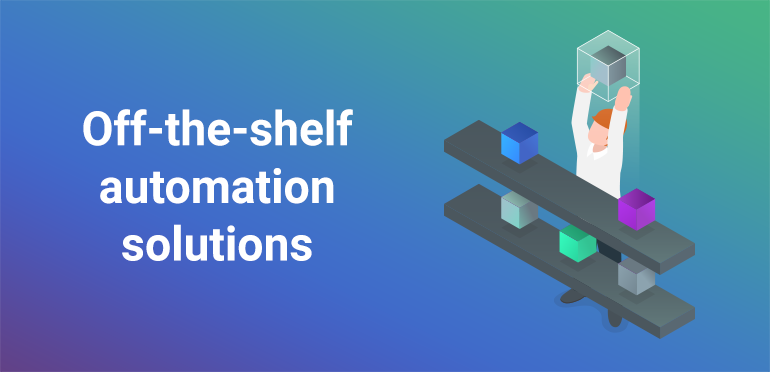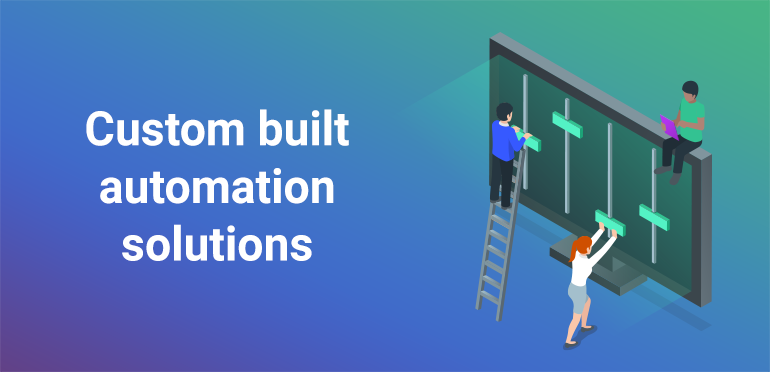Should you automate like everyone else does?

Every business is built on processes. No matter what products or services you provide; which markets you serve; or how your business is structured – all is underpinned by sequences of tasks and decisions.
By now, it’s no secret that enormous exponential value can be unlocked by automating both of these aspects with A.I. enabled automation. The automation revolution is truly underway, yet many businesses find themselves stumped by a single question:
“Do I use an off-the-shelf solution, or do I create something bespoke from scratch?”
This is no easy decision, yet it’s incredibly important, as there will be many ramifications down the road – no matter which way you go.
In this blog, we’ll lay out the pros and cons of each approach, and hopefully you’ll be a little more informed before making your choice.

Considering off-the-shelf
There are plenty of off-the-shelf automation solutions that are constantly being evolved to help businesses improve their ways of working. These are often designed to automate basic tasks that are shared by lots of organizations. The fact they are developed for this purpose means they are often fast and cheap to implement.
This makes an off-the-shelf solution a suitable short term fix if you have a fairly standardised manual process that is currently consuming a lot of time and resources. If you need to get value quickly and cost effectively, then going off-the-shelf could meet that need.
Since many other similar businesses have already used these products, it’s also easy for you to research them, read reviews and learn more before implementation. In many cases, you can also get a free trial or demo.
Though there are relatively common processes (think of those in accounting, marketing, HR, etc.), each business is made up of a different combination of systems and technologies, not to mention they have their own nuances in how they do things.
This becomes problematic when you attempt to automate processes with off-the-shelf solutions that are designed to fit the way “most” businesses operate. As well as failing to realise the maximum efficiency potential of your process, these types of solutions often run into trouble when it comes to integration with your existing systems and other related processes.
For example, you may be using an off-the-shelf solution to automate responses to customer requests, but this may not naturally or easily fit into the issue categories your organisation is using (such as maintenance, billing, returns etc.).
This lack of seamless compatibility means that you may still be operating in silos, and may even introduce limitations or complications to other processes.

Considering custom
When it comes to solving problems that are truly unique to your business or ways of working, there is no better answer than to build a custom automation solution from scratch. This is because every business requirement can be considered before any production begins, enabling a very specific objective-driven approach from day one.
Even for those common processes, custom solutions maximize the efficiency and ROI you can achieve because they are specifically designed to accommodate your unique nuances, as well as your existing systems and processes.
Building one-of-a-kind also means none of your competitors can use the same solution. This creates a significant competitive advantage over those that are trying to extract the same value from a “one size fits all” application.
These benefits of custom automation solutions often come at a higher upfront cost and longer implementation time when compared to off-the-shelf products. However, it’s important to note that this is quickly offset by the efficiency gains and long-term cost savings that surface over time.
You can try to improve off-the-shelf solutions with customisation, but this adds delays and costs to implementation, and you wouldn’t be gaining anywhere near the same level of bespoke objective-driven design as a custom solution.
In addition to these main points, there is also a noticeable difference between how easy it is to evolve and scale automation solutions as your business grows. In the majority of cases, custom solutions offer much more flexibility than those bought off-the-shelf. In comparison, off-the-shelf solutions may be more rigid and often increase in cost as you add more volume (users, products, customers, data etc.).
If you think custom automation might be the way to go, our expert consultants are more than happy to provide advice and answer any questions you may have.

Get the latest roundup of the most important, interesting and stories from the past week. In your inbox every Saturday by 10am.
Related Articles you might like
Key Strategies for Financial Institutions to Unlock AI Value
In the financial services sector, artificial intelligence (AI) is often heralded as a transformative force capable of revolutionizing everything from […]
View Blog PostIntelygenz President Chris Brown Shares Vision to Revolutionize Finance in FinTech Magazine
Intelygenz President Chris Brown was recently featured in an in-depth interview with FinTech Magazine, in which he outlined his mission […]
View Blog PostBridging the gap: From AI concepts to production success
In recent years, the conversation around artificial intelligence (AI) has shifted from theoretical possibilities to tangible realities. As businesses strive […]
View Blog Post

